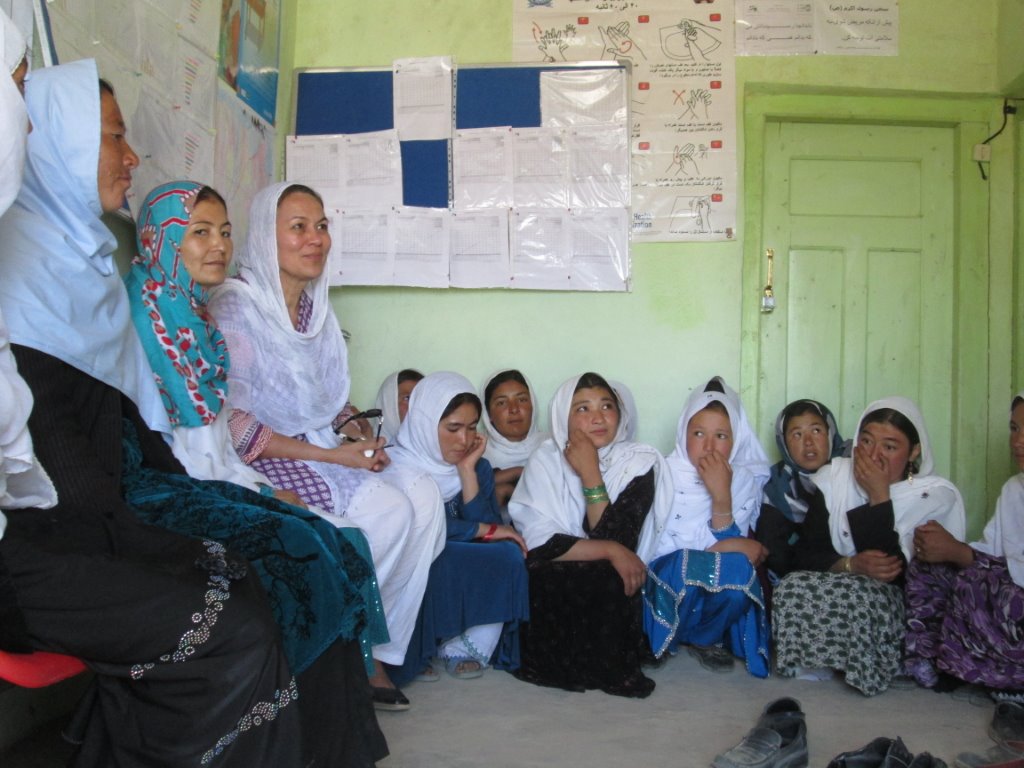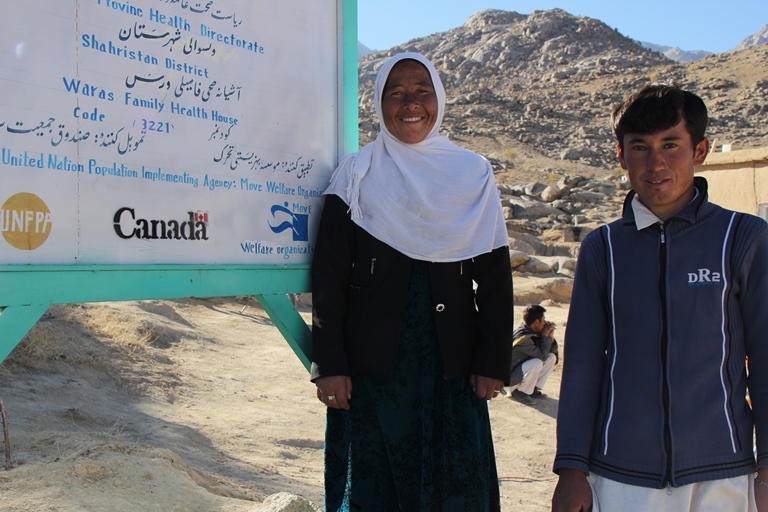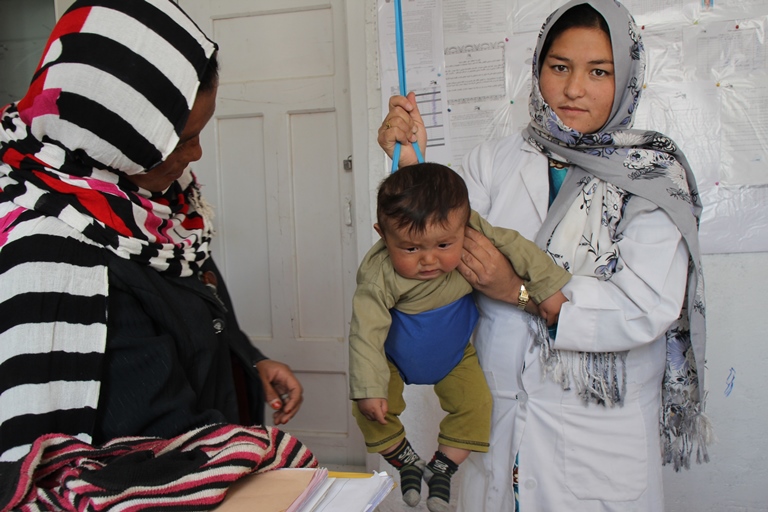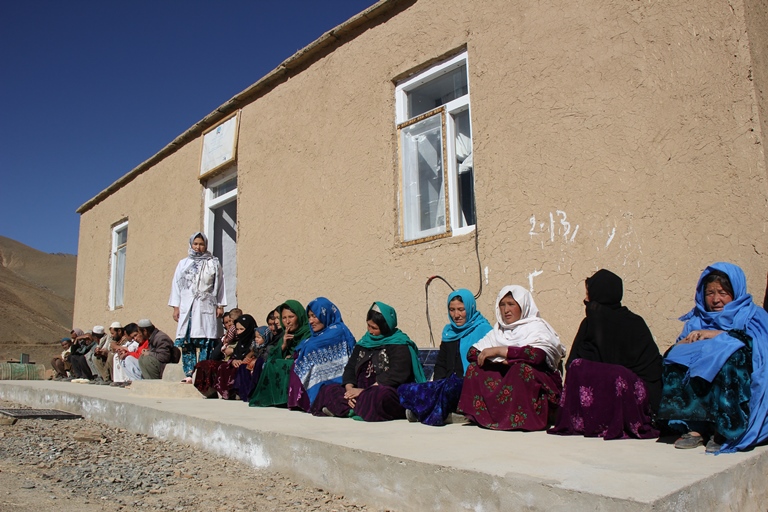UNFPA Afghanistan seeks to support the Government of Afghanistan to develop the structures to ensure that women have access to family planning and reproductive health advice and services. This includes the so-called ‘white areas' of the country, which are at least 10 km from the nearest health facility and include 43 percent of the population. Daikundi province is one of these areas where UNFPA, in collaboration with the Provincial Health Directorate and donors (Canada and Italy) is piloting the Family Health House model. These are community-based health structures serving 1,500-4,000 people and staffed by a trained Community Midwife recruited from the local population who provides reproductive, maternal, new-born, and child health services.Young community health workers take the lead in Afghanistan's remote villages

While their friends unwind from the school day, Kishwar and Rohullah have dedicated their free time to serving their community. As volunteer community health workers, the two students from Waras, a village in Daikundi province, advise and talk to their fellow villagers about their health.
Kishwar (20) spends most of her time at the Waras Family Health House (FHH) with Gul Chaman, a local midwife at the centre. She also visits the women who come to the FHH to discuss family planning in the comfort of their own homes. "I tell these women about the dangers of delivering at home. I emphasize the hygienic environment of the FHH and tell them about the births that already took place there. This convinces and encourages these women to at least come and take a look", says Kishwar. They often go back home with a smile on their faces because Gul Chaman is a very kind person and they trust her."
On his side, Rohullah (17) spends lots of his time with the men in the village. On his motorcycle he goes from one side of the village to the other to meet with them. Sometimes he gathers them at a chosen location where they come together to talk about politics, but most importantly about health and hygiene.
Proud

"Our community is small, so when I inform a group of men about a certain subject they tell the others", explains Rohullah. "Also, we know who is ill and who needs what kind of medical treatment. This way we can take care of each other and when needed, arrange transportation to the hospital. But our main goal is to inform people in order to prevent illness."
Kishwar and Rohullah are both proud of their work and they are dedicated to serving their community.
"Through my work as a community health worker, I have saved a woman's life. She had some complications during labour and she didn't know about the FHH", Kishwar says with pride. "When I heard from my fellow villagers about her case, I immediately went to her house and arranged for her to go to the FHH. Together with the midwife we saved her and her baby's life".
These young community health workers form a bridge between the community and the FHH and play an essential role in informing people about basic health and hygiene issues.
The pride of the community: How a midwife changed life in her village
She runs the busiest Family Health House (FHH) in Daikundi province. Twenty-three year old Hatifa delivered 57 babies in the last year alone. Some of the deliveries were easy, others more complicated, but ultimately all of the young midwife's patients and their babies survived.
This would have been a very different story last year, before the FHH was established. Pregnant women used to have to walk for hours to reach a health facility. Some of them died on the way. But since the FHH opened its doors, the people of Malmastoon are happy and proud.
"When I want to refer some of my patients to the nearest hospital because sometimes I don't have the facilities to help them, they refuse. Some of them even cry and say that they would rather die in my FHH than go to the hospital", says Hatifa.
Training
When the village elders heard about the Community Midwifery Education (CME) programme in Kabul, they voted for Hatifa to be the one to attend it. "They knew I wanted to serve my community and save lives", says Hatifa.
The Community Midwives receive 26 months of training at the Community Midwifery Education School in Kabul. UNFPA supports them on their education and, in collaboration with the communities, builds a basic but life-saving clinic where midwives can return once they end their studies.
After passing the selection test, Hatifa moved to Kabul City to enroll in the programme. "My mother wasn't happy at all! But I was very excited because it was my first time to leave my village without the company of my family. Once in Kabul I got so busy that I didn't even have the time to miss my family", the midwife continues.The first six months were theoretical, but during the latter part, Hatifa and her fellow students were sent to different hospitals to apply their knowledge. "During the two year programme I delivered 300 babies. I experienced all the different kinds of complications that could possibly occur while giving birth", says Hatifa.

"When I finished my education I returned back to my village and I knew that expectations would be high. I bought a stethoscope in Kabul so that I could start my work immediately", she recalls. "I gathered all the women from my village in my house and gave them information about safe birth and family planning. I still do this."
Complication
In the early days, before the FHH opened in the village Hatifa used to visit women in their houses to help them to deliver. There were times when Hatifa and her husband travelled by motorcycle to the most remote areas; sometimes they had to walk for hours because they couldn't go by motorcycle."
Today, Hatifa is a proud midwife and runs the busiest FHH in Daikundi province. Her patients call her the pride of their community.
"A couple of days ago I got a patient whose baby couldn't be delivered because it would be strangled by the umbilical cord. Somehow I managed to help this lady. When the baby was born it didn't breathe nor cry. Mouth to mouth resuscitation saved the baby's life. I usually save lives with my basic first aid skills."
Complicated births make me realize how important a midwife is
"I lost my sister-in law when she was in labour. I will never forget the day she died. Because of complications during birth, her condition worsened. We felt so helpless because we couldn't help her. When I heard about The Community Midwifery Education, I wanted to be selected so that I can serve my community. It was like a gift from God."
Midwife Gul Chaman Niazi (32) sits behind her desk in her examination room waiting for the next patient to come in. It's a little crowded in her Family Health House; the waiting room is full of mothers with children. But she is not stressed: fully confident, she examines her little patients and prescribes them medicines.
"Before the Family Health House four to five women used to die during labour per year. Even I almost died while giving birth", recalls Gul Chaman. "Luckily I survived, although I had four miscarriages. There was nobody to help me. I felt so miserable. I still can't believe I survived", she tells while she writes a recipe.
Strength

Because of her own painful experiences, Gul Chaman found the strength to help other women. "I'm a woman and no one understands pregnant women better than I do. That's why I want to help them."But before she could do that, she had to attend the Community Midwifery Education School in Kabul City. By the time she returned to her village, the Family Health House was almost completed. Today, it is fully functional serving not only the women in the community, but also men and children who come for basic health issues like a cough or the flu.Gul Chaman does not usually visit her patients at home. However she recalls a pregnant woman who could not come to the FHH because she was paralyzed. "At first I advised her to go to the hospital and get a cesarean because it seemed impossible for her to deliver a child in a normal way. But she refused and insisted on my help. She was convinced that she could give birth in a normal way", explains Gul Chaman. "I stood there and stared at her for minutes thinking of a way to help her. Whenever she had a contraction I turned her on her side from left to right. It took her five hours to give birth to a healthy baby."
"I was so happy when everything went well. In these moments, I realize how important a midwife is. We bring lives to this earth and at the same time we save lives. This gives me a lot of satisfaction."
The Family Health Houses are intended as sustainable community-led initiatives, where candidates for Community Midwives are nominated and supported by the community residents. The Community Midwives receive 26 months of training at the Community Midwifery Education School in Kabul. UNFPA supports them through their education and, in collaboration with the communities, builds a basic but life-saving clinic where midwives can return once they end their studies.


